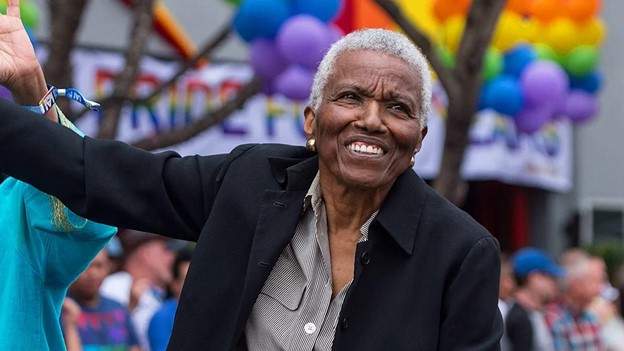By Trudy Ring
(Source: Yahoo!news)
Jewel Thais-Williams, owner of the legendary Los Angeles Black queer disco Jewel’s Catch One and an activist for HIV treatment and other causes, has died at age 86.
Several social media posters said Thais-Williams died Monday night, and her death has now been confirmed by TV station KTLA.
Thais-Williams, a lesbian, opened Jewel’s Catch One in the early 1970s because she saw that Black LGBTQ+ people in L.A. needed a space of their own. She had previously run a mixed club, where gay and straight Blacks and whites partied together. “It was kind of a miracle, really,” she once said.
“It was clear, though, that queer people of color needed a specific haven of their own,” Chanelle Tyson wrote in The Advocate in 2018, when Thais-Williams was the Legacy Honoree for the publication’s Champions of Pride. Gay clubs often discriminated against Blacks and women at the time.
“Unlike her first club, Catch One’s intention was gay from the start,” Tyson wrote. “It became so much more. In its prime, Catch One’s attendance swelled to 1,300 a night and attracted celebrities like Madonna, Sharon Stone, and Janet Jackson. As the climate of the world shifted, Catch One changed too, but over the staggering 42 years it was open, it always remained a safe and inclusive place for the black LGBT community.” Eventually, it “hosted the kind of integrated crowd that would have never been seen in a disco club before,” she added.
Thais-Williams was quick to respond to the AIDS crisis. She and her wife, Rue, established Rue’s House, which provided housing and services to women and children living with HIV or AIDS, in 1989. Thais-Williams had cofounded the Minority AIDS Project in 1987, and in 2001, she set up the Village Health Foundation, offering alternative treatments for HIV.
She closed Catch One in 2015, when she was 76. The club had survived much, including an arson attack in 1985 that nearly destroyed it.
“The joy experienced at Jewel’s Catch One club was more than a weekend choice for fun; it was an act of defiance by black lesbian, gay, bisexual and transgender people in the face of clubs in West Hollywood where they felt unwanted because of their race,” the Los Angeles Times reported upon the closing.
Thais-Williams remained active, though, volunteering part-time at the Village Health Foundation. The 2016 documentary Jewel’s Catch One by filmmaker C. Fitz chronicled her life and that of the nightclub. In 2019, the intersection of Pico Boulevard and Norton Avenue in L.A., the location of the club, was dedicated by the Los Angeles City Council as Jewel Thais-Williams Square.
She and her club are being remembered fondly. “Jewel’s Catch One was a sanctuary. It was a major part of the throughline of my own coming-out journey, and it was one of the few places where men and women got together,” actor-writer-producer Dalila Ali Rajah told The Advocate. “She also had the healing practice that was on the same property that allowed people of all kinds to get inexpensive, accessible, natural, homeopathic and Chinese medicine, health care, acupuncture, all of those things that were often out of the reach of the Black community. And during the AIDS crisis, it’s immeasurable the amount of impact she had on everything. And during the time where we are losing so much, to have someone cross over feels so heavy. But it also means we have an ancestor working for us on the other side. It’s just a hard thing to hold.”
Los Angeles journalist Karen Ocamb remembered Thais-Williams in her Substack column. They met in 1989 at the National Black Gay and Lesbian Leadership Forum in L.A. Ocamb was newly out and freelancing for the gay press, and she “started a decades-long precious friendship” with Thais-Williams. The second wave of AIDS, Ocamb recounted, made friendships intense. But they had many good times together, attending President Bill Clinton’s inauguration along with Rue in 1993 and then visiting the White House when Barack Obama was president.
Thais-Williams could hardly sleep the night before in anticipation of meeting the nation’s first Black president, Ocamb recalled. “But Obama had some emergency and rushed through the rope line,” she wrote. “VP Joe Biden, on the other hand, stopped and fixed his gaze on Jewel as if she was the only person in the East Room. Jewel also was thrilled to meet her personal hero, Rep. John Lewis.”
“I never told Jewel she was my hero,” Ocamb added. “Though as she closed her eyes the final time, as she felt my spiritual kiss on her cheek goodbye, as she prepared to meet all those friends and family who went before, I suspect she knows that the lighthouse light she lit for me will never dim until it is time for our friendship to be rekindled.”
“I was 30 years old when I first walked into Jewel’s Catch One and found my life,” activist Keith Boykin wrote on Instagram. That was the fall of 1995. While the club was frequented by celebrities, “I never went to see a celebrity,” he continued. “I was there because Jewel created a safe space for the Black LGBTQ community at a time when AIDS, homophobia, and many of our own churches made us feel unwelcome.”

